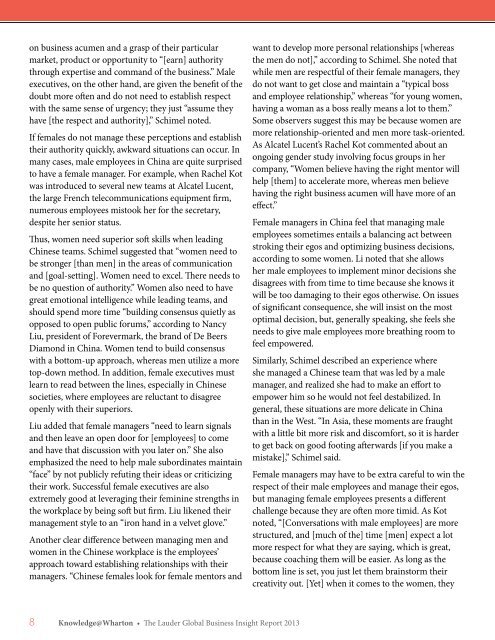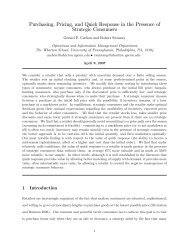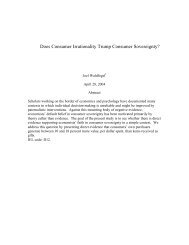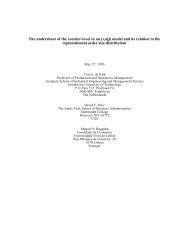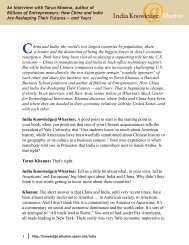building blocks for the Global economy - Knowledge@Wharton
building blocks for the Global economy - Knowledge@Wharton
building blocks for the Global economy - Knowledge@Wharton
Create successful ePaper yourself
Turn your PDF publications into a flip-book with our unique Google optimized e-Paper software.
on business acumen and a grasp of <strong>the</strong>ir particular<br />
market, product or opportunity to “[earn] authority<br />
through expertise and command of <strong>the</strong> business.” Male<br />
executives, on <strong>the</strong> o<strong>the</strong>r hand, are given <strong>the</strong> benefit of <strong>the</strong><br />
doubt more often and do not need to establish respect<br />
with <strong>the</strong> same sense of urgency; <strong>the</strong>y just “assume <strong>the</strong>y<br />
have [<strong>the</strong> respect and authority],” Schimel noted.<br />
If females do not manage <strong>the</strong>se perceptions and establish<br />
<strong>the</strong>ir authority quickly, awkward situations can occur. In<br />
many cases, male employees in China are quite surprised<br />
to have a female manager. For example, when Rachel Kot<br />
was introduced to several new teams at Alcatel Lucent,<br />
<strong>the</strong> large French telecommunications equipment firm,<br />
numerous employees mistook her <strong>for</strong> <strong>the</strong> secretary,<br />
despite her senior status.<br />
Thus, women need superior soft skills when leading<br />
Chinese teams. Schimel suggested that “women need to<br />
be stronger [than men] in <strong>the</strong> areas of communication<br />
and [goal-setting]. Women need to excel. There needs to<br />
be no question of authority.” Women also need to have<br />
great emotional intelligence while leading teams, and<br />
should spend more time “<strong>building</strong> consensus quietly as<br />
opposed to open public <strong>for</strong>ums,” according to Nancy<br />
Liu, president of Forevermark, <strong>the</strong> brand of De Beers<br />
Diamond in China. Women tend to build consensus<br />
with a bottom-up approach, whereas men utilize a more<br />
top-down method. In addition, female executives must<br />
learn to read between <strong>the</strong> lines, especially in Chinese<br />
societies, where employees are reluctant to disagree<br />
openly with <strong>the</strong>ir superiors.<br />
Liu added that female managers “need to learn signals<br />
and <strong>the</strong>n leave an open door <strong>for</strong> [employees] to come<br />
and have that discussion with you later on.” She also<br />
emphasized <strong>the</strong> need to help male subordinates maintain<br />
“face” by not publicly refuting <strong>the</strong>ir ideas or criticizing<br />
<strong>the</strong>ir work. Successful female executives are also<br />
extremely good at leveraging <strong>the</strong>ir feminine strengths in<br />
<strong>the</strong> workplace by being soft but firm. Liu likened <strong>the</strong>ir<br />
management style to an “iron hand in a velvet glove.”<br />
Ano<strong>the</strong>r clear difference between managing men and<br />
women in <strong>the</strong> Chinese workplace is <strong>the</strong> employees’<br />
approach toward establishing relationships with <strong>the</strong>ir<br />
managers. “Chinese females look <strong>for</strong> female mentors and<br />
8 <strong>Knowledge@Wharton</strong> • The Lauder <strong>Global</strong> Business Insight Report 2013<br />
want to develop more personal relationships [whereas<br />
<strong>the</strong> men do not],” according to Schimel. She noted that<br />
while men are respectful of <strong>the</strong>ir female managers, <strong>the</strong>y<br />
do not want to get close and maintain a “typical boss<br />
and employee relationship,” whereas “<strong>for</strong> young women,<br />
having a woman as a boss really means a lot to <strong>the</strong>m.”<br />
Some observers suggest this may be because women are<br />
more relationship-oriented and men more task-oriented.<br />
As Alcatel Lucent’s Rachel Kot commented about an<br />
ongoing gender study involving focus groups in her<br />
company, “Women believe having <strong>the</strong> right mentor will<br />
help [<strong>the</strong>m] to accelerate more, whereas men believe<br />
having <strong>the</strong> right business acumen will have more of an<br />
effect.”<br />
Female managers in China feel that managing male<br />
employees sometimes entails a balancing act between<br />
stroking <strong>the</strong>ir egos and optimizing business decisions,<br />
according to some women. Li noted that she allows<br />
her male employees to implement minor decisions she<br />
disagrees with from time to time because she knows it<br />
will be too damaging to <strong>the</strong>ir egos o<strong>the</strong>rwise. On issues<br />
of significant consequence, she will insist on <strong>the</strong> most<br />
optimal decision, but, generally speaking, she feels she<br />
needs to give male employees more breathing room to<br />
feel empowered.<br />
Similarly, Schimel described an experience where<br />
she managed a Chinese team that was led by a male<br />
manager, and realized she had to make an ef<strong>for</strong>t to<br />
empower him so he would not feel destabilized. In<br />
general, <strong>the</strong>se situations are more delicate in China<br />
than in <strong>the</strong> West. “In Asia, <strong>the</strong>se moments are fraught<br />
with a little bit more risk and discom<strong>for</strong>t, so it is harder<br />
to get back on good footing afterwards [if you make a<br />
mistake],” Schimel said.<br />
Female managers may have to be extra careful to win <strong>the</strong><br />
respect of <strong>the</strong>ir male employees and manage <strong>the</strong>ir egos,<br />
but managing female employees presents a different<br />
challenge because <strong>the</strong>y are often more timid. As Kot<br />
noted, “[Conversations with male employees] are more<br />
structured, and [much of <strong>the</strong>] time [men] expect a lot<br />
more respect <strong>for</strong> what <strong>the</strong>y are saying, which is great,<br />
because coaching <strong>the</strong>m will be easier. As long as <strong>the</strong><br />
bottom line is set, you just let <strong>the</strong>m brainstorm <strong>the</strong>ir<br />
creativity out. [Yet] when it comes to <strong>the</strong> women, <strong>the</strong>y


